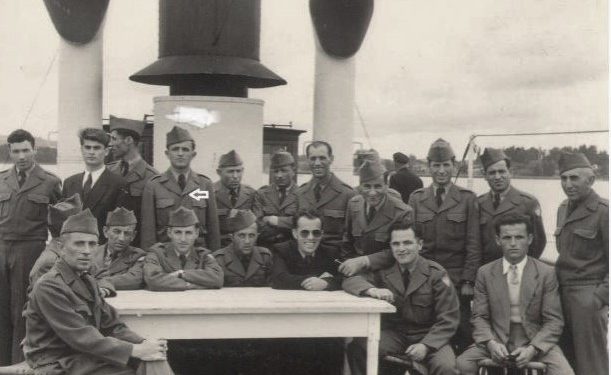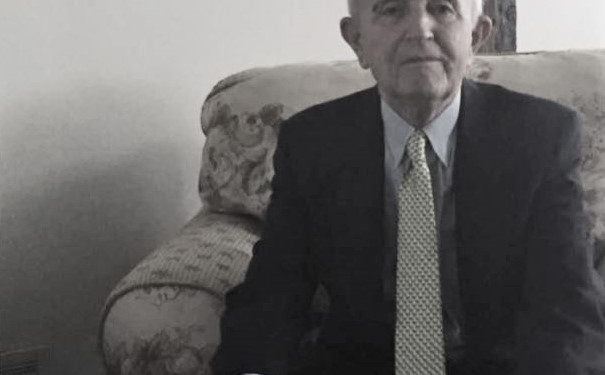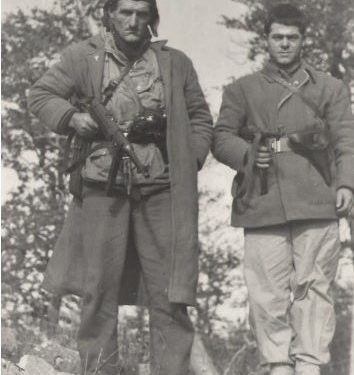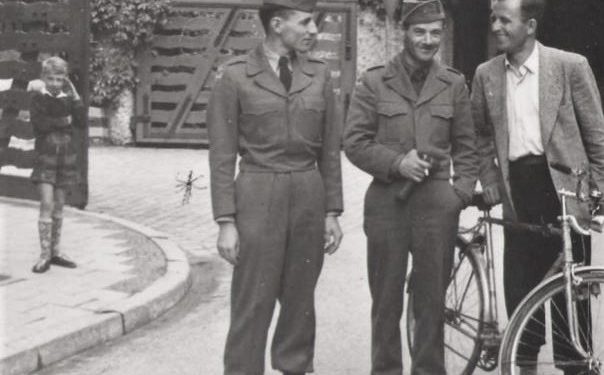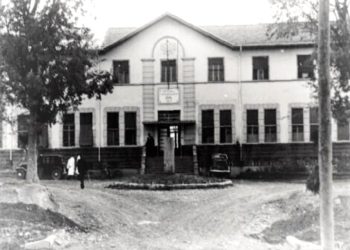By Petrit Palushi
– The truth of the activity of the “Company 4000” according to the notes of Neshat H. Bilal, a former member of this company, now residing in the USA. Life in secret, training, and political divisions between the leaders and supporters of Legality, the Independent Bloc of the National Front.
Memorie.al / “Kompania 4000” in Germany, was created in 1950, by the American Secret Service in cooperation with the “Free Albania” Committee, for the training of Albanian immigrants (fugitives) and their departure to Albania with activities against communist regime. It has been written about the history of this Company, but we are forwarding the notes of Neshat H. Bilal, former member of “Company 4000”. Neshat H. Bilali (from Bicaj e Lumė), currently residing in the USA. Neshat H. Bilali, from a young age, a collaborator of the well-known nationalist Muharrem Bajraktari. He escaped from Albania to Greece in August 1946, spent five years there in emigration and on July 17, 1951, he went to West Germany, where he was included in Company 4000. On December 13, 1955, he went to the USA, where he also lives. today. At the same time, he is the author of the books: “Muharrem Bajraktari in my memories” (2002), “With Muharrem Bajraktari towards Greece” (2011), “Notes on history: 1939-1955 (2012)
Testimony of Neshat H. Bilal
In 1950, a working company was formed in West Germany. It was called “Company 4000”. Most of the personnel in that company are from Italy. The company probably arrived with up to 250 people or more.
The “Free Albania” committee, in cooperation with the CIA, formed the “Company 4000” to use it to send paratroopers to Albania. The Company included several groups or otherwise immigration parties, such as Legality, the Agrarian Party or the National Front, and those of us who had stood by Muharrem Bajraktar, as well as a group of Kosovar Albanians, represented by Seit Kryeziu.
All the members of the Albanian parties who were in emigration joined the Company 4000. Those who collaborated with the occupier in Albania were not accepted in the Company. So, we also went there with two groups of Albanians who were in Greece, less than 50 people.
The trip from Greece on July 17, 1951
We went to Germany to train him that, if the occasion arose, we needed him to return to Albania, to fight and overthrow the communist regime. I stayed in Germany until December 13, 1955, when I left for the USA, where I still live today.
We made the trip at night in a secret military plane. Where the plane stopped, we boarded three Company 4000 trucks and morning found us at the Company base. Immediately, we were directed to the kitchen where we had breakfast. After the meal, we were told that we had to separate: Legality on one side and Agrarian Front on the other. Each party took its men and took them to the barracks. They parted like a living thing. I was surprised by that part. I thought that there, there was some order like in a national army.
They called us to the office to register us and provide us with documents. They told me that in order to stay in the Company, I had to register with one of the parties. I told them that in Greece, when they interrogated us, they did not ask us about the party. I told them to inform the American captain that, if this was mandatory, I almost laughed and went back to Greece. The next day I was informed that, for us in Muharrem Bajraktari’s group, it was not mandatory (it was a rule that the parties had set in order to be members of the “Company 4000”).
They had communicated the same thing to Esat Bajraktari, the son of Muharrem Bajraktari. However, Esat Bajraktari and I also told us that we had to go to the barracks, where the Kosovars lived who were not members of the Legality party or the Agrarian Front, but belonged to Sei Kryeziu’s party. In truth, those Kosovars were more sympathizers of Xhafer Deva than Sei Kryeziu; if they said they were sympathizers of Xhafer Deva, they were not accepted in the Company. Seiti and Xhaferi had made an agreement in that case.
“Company 4000” activity
I am describing where Company 4000 was located and the life that took place there. The company, which stabilized with a village 15 km. south-west of Munich. The village was called Vekterhof. The barracks where the personnel stayed were barracks since the time of Hitler.
In the beginning, after they oriented us about the work we had to do there, they gave us work clothes and uniform clothes. On the left side, we had a certain sign like the American flag, but at the top we wrote: ALBANIA. We were distributed among work teams. Our work made me a guard in some military warehouses of the American army. We worked for the Americans, but were paid by the Germans. The salary was close to $50 a month.
We didn’t pay anything for food, sleep and clothing. We had health insurance from the German insurance. For the few years that I worked in West Germany, I still receive a small pension from the German state. I got a friend there and he assigned me to Motor Pool. That thing, as they told me, was a good and privileged job, because I worked 5 days a week and had Saturday and Sunday off. The friend who stayed there was called Rustem Kuçka from Peshkopie (Diber). He had headed the Military Academy in Italy, at the time of Zog. After the capitulation of Italy, you went to Italy and you also finished the Law.
In essence, it was thought that ‘Company 4000’ had been the core of the Albanian Democratic Army. But the work that was done there was not at all national, but all party work. For each year, there was an additional salary. Extras were made like after parties and who you had more friends with. As long as I stayed there, my salary was increased only once. I considered myself to be a good worker. The salary increase that was given to me, made me from the last soldier, to corporal. To be fair, we were just workers. Most of the Labor Service were German and we were part of them.
In charge of the kitchen was Ramazan Nuredini, from Mati. Once a week, we went to the warehouse to buy food. There we bought everything that a person needed most, it kept me healthy. It’s just that we didn’t have the right to buy alcohol. Ramadan was from the Legality Party. We Albanians never order pork, but only beef or mutton. Of Legality, they don’t eat pork. Neither the Kosovars, nor us from Muharrem Bajraktari’s group. Those of the Agrarian Front demanded pork, as if to anger the Legality and the Kosovars. That stupid problem lasted a few months. Abaz Ermenji had to intervene, he calmed down the situation.
When the CIA needed to send people to Albania, requests were made in Rome to the “Free Albania” Committee. In Rome, the names of those who were capable of doing the work were given. Most of those who were sent to Albania had no knowledge of what awaited them when they landed in Albania.
In Germany, I saw the divisions that had been created in the Company, between the two big parties, Legality and the National Front. When Abaz Ermenji came, only those from the National Front came out to meet him, when Gaqo Goga came, only those from Legality came out (Two words about Gaqo Goga. He was everything to Abaz Kupi. But one day, Abaz Kupi expelled him from the party Gaqo Goga was born in Odesa, Russia. His mother was Russian, and his father was from Korce. He was said to have been an informer for the Communist Government, within the “Free Albania” Committee. So there was a lot of dissatisfaction.
The two main parties had divided Albania into two areas of influence; almost the entire South belonged to the National Front, while the North belonged to Legality. When they took people to Albania, everyone sent their own people to their own areas. Only Muharrem Bajraktari, when he started the mission in Lumë, got the people together. For Legality, in Company 4000, the lists were made by Xhemal Laçi. In many cases, neither Xhemal’s friends, nor those of Çaush Basho, were assigned to be sent to Albania. Of those who went on a mission to Albania, few returned alive.
The parents who were members of the Committee sent others to Albania, but their sons were sent to America and other countries. Abaz Kupi had two illegitimate sons: you had sent one to America and the other to Australia, while Abaz Ermenji had sent his brother to Australia. Hasan Dosti as well. He had sent his own son to America, and other people’s sons, he assigned to send them to Albania.
If he started in Albania at that time, it was the same as being sentenced to death. Only Muharrem Bajraktari, a boy who was left with him, sent him to the Company, to train and go back and fight in Albania. The case did not allow him to go to Albania. Muharrem Bajraktari sent Liman Peposhi and Tahir Vata (who were from Lume) to Lume. Later, two people from the Agrarian Party fell into the river: Faik Dalipi and Dule Koçiu.
There were three groups in the West that sent people to Albania: Group No. 1 – “Free Albania” Committee, no. 2 – Italy, with the “Independent Bloc”; no. 3 – Greece in cooperation with some Albanians. With all these groups, the Anglo-American service cooperated. Also, the Yugoslav Security Service sent from Yugoslavia. Even those from Yugoslavia committed crimes when they entered Albania.
The English have nothing to do with the ‘Company 4000’. Only Americans have to do with the ‘Company 4000’. Only they took people from this Company and prepared them to send them to Albania.
Officers of Company 4000:
Balli Agrar Party:
Çaush Basho (company commanders)
Rustem Kučka (with military academy & lawyer)
Adnan Ypi (with military academy)
Legality:
Xhemal Laçi (n/commander, with military academy)
Isuf Dema (former Albanian army officer)
Hysen Sallku (former officer in the Albanian Gendarmerie)
To Seit Kryeziu:
Kole Hila (with military academy)
No Albanian was capable of office administration. Therefore, the Labor Service Command had sent a German who knew English well to work in the office. The German was named Langer. There were also two Albanians as assistants (Niazi Bardha, of Balli Agrar, and Namik Pasholli, of Legality). Langri had the rank of officer. He learned foreign languages quickly. I didn’t even learn Albanian. During the war, he served on a submarine as a translator for the German army, because he spoke English well.
From 1955, it was said that the Italian government was putting pressure on the Americans, so that the “Free Albania” Committee would be enlarged and ex-fascists would also be accepted in the Committee. Even the Americans were determined that the Committee be enlarged. The committee decided that the executive should have 12 people, while the legislature should have 25 people. Abaz Ermenji, who stated that he did not cooperate with the ex-fascists, left that Committee and went to France, created a new committee, where he put himself in charge.
And in 1955, a couple of groups of Albanians that the Americans were preparing to leave for Albania returned them to the Company. Some signs were showing that the Company was not seen with political eyes as before, but only as a working company. In the Company there was a detachment of the American army, of 4-5 years. Two of them were of Albanian origin from Dardha e Korça, but born in America (Commander of the detachment, Thomas Mangely and N/Officer Spiro Bushi; both spoke a little Albanian).
When the changes started in the committee, changes were also made in the company. One day, a new American officer arrived, with the rank of captain, while the n/o officer who came with him was African American. Thomas Mangely and Spiro Bushi were transferred elsewhere.
Disputes between parties
The intrigues and divisions of the two big parties were increasing more and more. Now, the committee did not have influence in Company 4000, keep calm. A war began as to who was more friendly to the American captain. The American captain drank a lot of beer, but Adnan Ypi also had a lot of fun; thus, they became friends among themselves.
Çaush Basho did not get along well with Xhemal Laçi. When Çaush Basho, who assured that he had made the American captain his own, accused Xhemal of not performing the assigned duties and convinced the American captain to remove him from the Company. Xhemali had nowhere to complain that the committee had no more power, so he remained unemployed on the streets.
The words that were being said up and down that the committee was disbanding were turning out to be true. It was said that in Rome, Abaz Kupi, Muharrem Bajraktari and Seit Kryeziu were informed that the political committee was dissolved and replaced by an economic committee. Free Europe had undertaken its formation, with a smaller budget, and had requested that they recognize him and that he would give them a salary each. But, for some time, they have refused to recognize that committee.
While Abaz Kupi objected to the recognition of the committee, Gaqo Goga, on the other hand, spoke about the formation of the committee, who should recognize it. Thus, Legality was also divided.
To announce the economic committee, it took a long time, because no suitable people were found. Behind the back, Xhafer Deva was working. He proposed Rexhep Krasniq as chairman and Vasil Gjermeni, Nexhat Peshkepina and Ndue Gjon Marku as members. The CIA presented these as persons of Free Europe and thus the committee was formed, which was also called the ‘Xhafer Deva Committee’.
The function of this committee was to celebrate the 28th of Nandor every year and any Albanian who was in Western Europe and wanted to immigrate to America became a guarantee. The budget was limited. A room they had rented was called the office of the committee.
The economic committee was not announced by any political party, with the exception of the Independent National Bloc. Gaqo Goga, even though he declared that he had informed the new committee, he was not invited to participate. Rexhep Krasniqi, until he died, called himself the chairman of that Committee. Memorie.al




